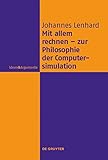Mit allem rechnen - zur Philosophie der Computersimulation / Johannes Lenhard.
Material type: TextSeries: Ideen & ArgumentePublisher: Berlin ; Boston : De Gruyter, [2015]Copyright date: ©2015Description: 1 online resource (212 p.)Content type:
TextSeries: Ideen & ArgumentePublisher: Berlin ; Boston : De Gruyter, [2015]Copyright date: ©2015Description: 1 online resource (212 p.)Content type: - 9783110401172
- 9783110401387
- 9783110401363
- 303/.3
- QA76.9.C65 L46 2015
- online - DeGruyter
- Issued also in print.
| Item type | Current library | Call number | URL | Status | Notes | Barcode | |
|---|---|---|---|---|---|---|---|
 eBook
eBook
|
Biblioteca "Angelicum" Pont. Univ. S.Tommaso d'Aquino Nuvola online | online - DeGruyter (Browse shelf(Opens below)) | Online access | Not for loan (Accesso limitato) | Accesso per gli utenti autorizzati / Access for authorized users | (dgr)9783110401363 |
Frontmatter -- Vorwort -- Inhalt -- Einleitung -- Teil I: Ein neuer Typ mathematischer Modellierung -- 1. Experiment und Artifizialität -- 2. Visualisierung und Interaktion -- 3. Plastizität -- 4. Epistemische Opazität -- 5. Ein neuer Typ mathematischer Modellierung -- Teil II: Begriffliche Verschiebungen -- 6. Lösung oder Imitation? -- 7. Validierung und Grenzen der Analyse -- Teil III: Fazit und Ausblick -- 8. Epistemologie und Simulation – Fazit und Ausblick -- Literatur -- Namenindex -- Sachindex
restricted access online access with authorization star
http://purl.org/coar/access_right/c_16ec
How have computers and simulation models changed scientific practice? Johannes Lenhard examines the methodology and epistemic nature of computer simulations. The conception of mathematical modeling that has so dominated modern science is undergoing redefinition: theory and technology are becoming inseparably connected, thereby resulting in a convergence of the natural and engineering sciences.
Im vorliegenden Buch geht es um die methodologische und epistemologische Charakterisierung der Computersimulation. Zu diesem Zweck werden Computermodelle vor der Kontrastfolie mathematischer Modelle betrachtet. Eine Strategie der Mathematisierung zielt darauf ab, komplexe Phänomene in idealisierter Form zu modellieren und so die Komplexität zu reduzieren. Die Simulation markiert das Ende dieser Strategie: Die Modelle werden nun selbst komplex und erhalten eine partielle Autonomie.Insbesondere der Prozess der Simulationsmodellierung erfährt gegenüber traditioneller mathematischer Modellierung eine Transformation. Als zentrale Merkmale der Simulationsmodellierung werden anhand typischer Beispiele analysiert: Artifizialität, Experimentieren, Visualisierung, Plastizität und epistemische Opazität. Erst aus der Verknüpfung dieser Merkmale resultiert ein philosophisch neuartiges Bild, das wiederum zum Diskurs um das Verhältnis von Wissenschaft und Technik beiträgt.
Issued also in print.
Mode of access: Internet via World Wide Web.
In German.
Description based on online resource; title from PDF title page (publisher's Web site, viewed 28. Feb 2023)


